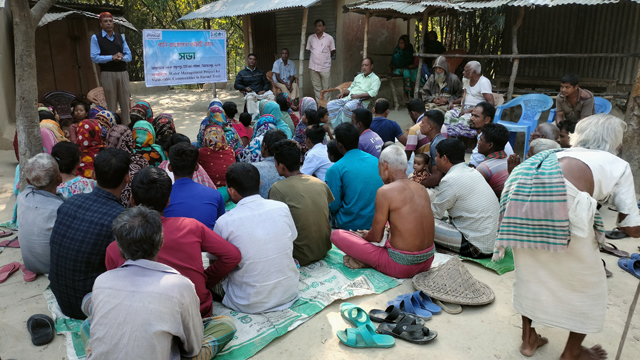
By Md Aynal Haque
RAJSHAHI, Nov 15, 2023 (BSS) - Around 61,811 households consisting of
2,48,351 populations victimized badly by the climate vulnerabilities will get
water in the drought-prone Barind area.
To this end, 134 submersible pumps will be installed for drinking water
together with 16 managed aquifer recharge systems to boost ground water, 24
rainwater harvesting systems and re-excavation of 20 ponds for domestic uses.
There are also provisions of re-excavating nine canals together with
construction of check dams for supplementary irrigation and preserving water
for welfare of the beneficiaries.
Apart from this, 900 irrigation systems of Alternate Wetting and Drying (AWD)
will be installed to reduce water consumption for Boro rice farming side by
side with promoting 44 drip irrigation system in fruit orchards as a proven
means of water efficient technology and three earthen dams for supplementary
irrigation.
On behalf of a project titled "Water Management for Vulnerable Communities in
Barind Tract", the physical infrastructures will be promoted focusing on
improvement of overall living and livelihood conditions of the beneficiaries.
DASCOH Foundation has started implementing the three-year project in eight
Unions of Niamatpur upazila in Naogaon district financially supported by the
Coca-Cola Foundation.
Salient feature of the project are: optimum use of surface and rain water,
saving water, provide safe and secure drinking water to the vulnerable
community, particularly extreme poor and ethnic minority, increase ground
water level, takes rain water in the aquifer directly after filtration and
start conserving water around their home.
Project Manager Jahangir Alam Khan said utmost emphasis will be given on
increasing the availability of water for disadvantaged people in the Barind
area through sustainable, effective, inclusive management with engagement of
and use of local government institutions.
The project will provide services to around 24,232 households consisting of
96,540 direct beneficiaries and 70 percent of them are extreme poor and
disadvantaged ethnic minorities. Around 36,049 other households consisting of
1,44,810 populations will get benefits from the project activities.
The beneficiaries will be given knowledge on how the communities can reduce
the need for extracted water from ground sources and to reduce contamination
of surface water with pesticides, sediment, metals, and fertilizers.
He mentioned that the project will use a participatory process to provide
communities with organisational tools that enable them to analyse their
existing situations and plan for the future.
It will also work for creating demand for improvements to the availability
and standard of water services in the communities and build awareness.
Focus will be given on supplementary irrigation through preserved surface
water, promoting water efficient technology to save ground water and preserve
rain water in the natural reservoir, including canal, beel, pond.
In addition to drinking and irrigation water, the project will focus
initially on community institution building and awareness-raising in the
communities as there is demand for improved water management systems.
One of the beneficiaries Monika Hembrom 45, of village Panihara said that the
project will bring a positive change to water-stressed areas related to
changes of water resource usage patterns.
They will be benefited in terms of changing cropping patterns, particularly
farming of less-water consuming crops, utilization of reserved surface water,
harvesting rainwater to recharge aquifers and the protection of safe water
sources from contamination.
Another beneficiary Bhupen Tudu 55, of village-Beldanga Missonpara said the
increased interaction between Union Parishads and communities will improve
the capacity of local government to deliver equitable water services to the
community.
Rasulpur Union Parishad Chairman Muhammad Muttalib said their area is
characterized as disadvantaged and hard to reach together with harsh climate
and scarcity of water downsizing development indicators.
He, however, said the project is expected to contribute a lot towards
bringing ease to the life of the beneficiaries through mitigating their
existing water crises.